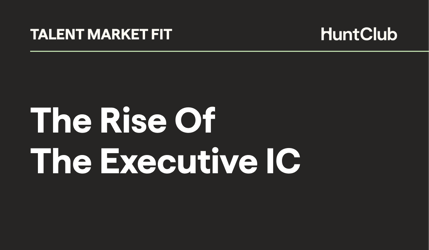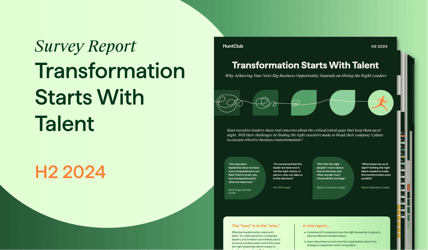- Executive Search
- Professional Search
- For Candidates
-
More Topics
- Business Insights
- Consumer
- DEIB
- Early Stage
- Engineering
- Enterprise
- Events
- Expert Community
- Featured Topics
- Finance
- Fintech
- Funding
- Growth Stage
- Healthcare/Health Tech
- Hunt Club News
- Interviewing
- Job Descriptions
- Marketing
- Martech
- Network Recruiting
- Operations
- Partner Stories
- People
- Podcast
- Press Release
- Private Equity
- Product
- Professional Development
- Recruitment
- SaaS
- Sales
- Talent Relationship Management
- Technology
- TMF
- Venture Capital
- Video
- Work Culture
-
Topics
- Business Insights
- Consumer
- DEIB
- Early Stage
- Engineering
- Enterprise
- Events
- Executive Search
- Expert Community
- Featured Topics
- Finance
- Fintech
- For Candidates
- Funding
- Growth Stage
- Healthcare/Health Tech
- Hunt Club News
- Interviewing
- Job Descriptions
- Marketing
- Martech
- Network Recruiting
- Operations
- Partner Stories
- People
- Podcast
- Press Release
- Private Equity
- Product
- Professional Development
- Professional Search
- Recruitment
- SaaS
- Sales
- Talent Relationship Management
- Technology
- TMF
- Venture Capital
- Video
- Work Culture
For Growing Companies, Headcount, Once a Symbol of Progress, Has Become a Problem
The illusion of more For years, growth had a relatively simple formula: more — at all costs.

The New Corporate Bet: Growth and Efficiency… Without Hiring?
The headcount headlines dominating the workplace Amazon’s recent job cuts of 14,000 are just the latest signal of a growing corporate mindset: the …

Hiring Early to Growth Stage Sales Leaders: 5 Red Herrings That Trip Teams Up
Hunt Club is seeing a surge in clients building Sales teams – from pods of AEs to new leaders who can ramp ahead of Q1 2026. The stakes are clear: …

Startup-Inspired Org Design: The Most Misunderstood Playbook in Business Right Now
A small, talent-dense team focused on breakthrough AI research. A lab operating with lean squads that can experiment, iterate, and deliver impact at …

How Sator Grove Plays the Decades-Long Game (And Wins)
Buy one company. Then another. Stitch them together under a shared philosophy. Scale faster, smarter, better…. Let the good times roll.

What $1B rollups obsess about (and it's not AI)
105 companies. 100+ deals in 8 years. Seller NPS near-perfect. $1B revenue.

How Does a First-Time IT Outsider Build a $1B MSP Rollup?
"This isn't going to sound all that groundbreaking..." Those are the words of Elliott Hyman, CEO of Lyra Technology Group, before sharing with us the …

The AE Boom: Why Top Companies Are Racing To Hire Them.... and How to Win Your Share
Not long ago, Account Executives thrived in predictable, playbook-driven environments where outbound volume, SDR-to-AE handoffs, and “dialing for …

Building the Modern CFO Profile: Lessons From Laurence A. Tosi on Identifying & Recruiting World-Class CFOs
Few leaders have influenced modern finance and company-building as profoundly as Laurence A. Tosi (also known as “L.T.”).

Designing Marketing Teams for What’s Next: 5 Emerging Org Structure Trends
The structure of modern marketing organizations is undergoing a fundamental shift.

AI’s Impact On Growth Marketing Organizations: Real-Time Gains & What’s Next For Team Structure
Where does AI fit in a team rooted in human creativity?

How to Position Yourself as a Candidate in the World of AI
What Sales, Marketing, and Customer Success Talent Should Know With AI, a tough job market is about to get that much tougher. Right now, AI is …

A Closer Look Into Hunt Club's Financial Officer Practice
Navigating the Talent Crunch Skyrocketing CFO Demand Across industries and asset classes, but especially in private equity, the scarcity of …

The operating modality scorecard the top 1% of hiring managers use
There’s one thing the best hiring managers assess that most others miss: Operating modality.

Where Does AI Fit in Your GTM Org? A Framework for Hiring AI Roles Across Revenue Teams
AI has come a long way from being just a buzzword. These days, it’s playing a real role in how go-to-market strategies get shaped and how GTM teams …

Buying over building? The rise of entrepreneurship through acquisition
I remember thinking when I was younger—why would I ever want to work for a small business in my hometown when I could join a tier 1 consulting firm …

Recruiting AI Talent: 3 Helpful Strategies To Maximize Your Success
1. Apply the Bar-to-Brand Barometer Think about your perfect AI leader. What is your “hiring bar” for their skills, education, prior company …

How Candidate Sources Affect the Hiring Process & Employee Tenure [+ 4 Tips On Driving Inbound Candidates]
Candidate Source Impacts Candidate Response & Offer Acceptance Rates Referred candidates, who are generally sought-after passive job seekers, are …

The Evolving Job of Engineers in the Age of AI and Its Impact on the Future of Hiring
Meta’s AI ambition and the industry impact At the beginning of the year, Mark Zuckerberg revealed on a podcast that engineers at Meta are developing …

The Rise of the "Super" IC/Executive IC
There’s an interesting trend we’re seeing right now that I thought was worth diving into. I’ll hit the headline—if anyone has questions, ping me.

3x CMO to CRO? The Leadership Movement That's Taking Over GTM
The market moves fast... Is your GTM keeping up? Hunt Club's Chief Revenue Officer, Judd Marcello, is actually a 3x Chief Marketing Officer.
.png?width=450&height=250&name=infographic%20feat%20image%202%20(2).png)
Finding Executive Talent Is Complex Enough—The Wrong Search Partner Can Add More Risk
The flawed hiring playbook When hiring executive leaders to drive transformation, organizations typically continue to rely on an outdated benchmark: …

Is Your Tech Organization Ready To Drive Change, or Resistant? How to Assess.. Then Adapt
Tech is evolving faster than we can blink—bigger phones, smarter homes, AI everywhere. It’s an integral part of many of our lives, just as much as it …

You Might Be Prioritizing the Wrong Qualities in Executive Candidates—And It’s Costing You
There’s always been a way of doing things. For the most part, if a tradition takes root, it’s because it works to some degree. There’s a level of …

Actually, Checking All the Boxes Might Not Get You the Talent You Really Need
We all love a good checklist. There’s something deeply satisfying about checking off those boxes—it reassures us that we’re covering all the bases …

Hiring Has Never Been This Complex. Why Is Finding a Bullseye Candidate Nearly Impossible?
Hiring has never been this complex. Just a few years ago, when hiring a CxO, a traditional recruiter with a well-manicured rolodex was called to do …

10 Questions To Stress-Test & Grade Your Hiring Strategy & Its Effectiveness
Hiring talent is one of the most critical drivers of organizational success, yet most companies struggle to get it right. Take, for instance, these …

Define It, Build It, Measure It: 3 Actions and Indicators To Measure If a Talent Strategy Is Working
The “perfect fit” isn’t a myth. Your bullseye candidate is out there, but it’s harder than ever to find them...

Product vs. Sales-Led Growth: Leadership Differences, Gaps & How To Mind Them
The Top Priorities & Business Transformations On Everyone’s Minds…

Cosmetic…or Catalytic? Allen Mask Dissects the Anatomy of a Transformative Rebrand & the Talent It Takes
At its surface, a rebrand promises a fresh coat of paint—a new identity to help your business stand out in a crowded market. But beneath this lies an …

GTM Expert Judd Borakove Shares the Top 4 Indicators Your Org Might Have the Wrong GTM Leaders In Seat
GTM Is Driving How Teams Are Built GTM over recent years has come a long way from how we first viewed the term. Go-to-market used to describe a …

2024's Impact on 2025: What Finance, Tech & GTM Leaders Need to Know
The measures leadership teams took to steady their businesses this past year are helping change the tide as 2025 arrives... After chasing stability …

2025 Product Strategy at Risk? These 4 Leadership & Skills Gaps Could Be Why
“I've seen how leadership and skills gaps can cascade into organizational dysfunction. The gap between good and great executive leadership isn't …

From Talent Shortages to Surpluses… and Back Again? What’s the “Right” Hiring Strategy in the Tech World Right Now?
A Retro of Tech Hiring (And All Its Craziness Driving Companies Crazy) In the last few years, the tech recruiting landscape has been nothing short of …

Going Global? Here’s How To Hire Executive Talent For the World Stage (the Right Way)
The calendar inches closer to 2025 and you’re ready to embark on a massive new undertaking: Taking things global and executing international …

2025 AI Plans? Not So Fast. Here's How To Find the Right Talent First
Identifying AI talent today feels a lot like catching lightning in a bottle... The rapid pace of innovation means skills that were cutting-edge a …

MasterClass’s CPO, Mel Steinbach, on the Critical Skills Transformative People Leaders Need
Talent and transformation. You can’t have one without the other. Business transformations are not merely about adopting new technologies or …

Now Hiring Executives! (Must Love Driving Change & Come With Proven Playbooks)
Lately, founders, investors, and companies at large have all been grappling with one thing: uncertainty...

Who's Driving Your 2025 Strategy? 4 Executive Archetypes To Assess Your A-Team Better
Companies big and small, early-stage and mature, all have their eyes on the prize: Transformation in the new year.

Do You Have the Right Leaders in (Board) Seats? 6 Archetypes That Drive Real Business Transformation
When it comes to driving real business transformation and change, not every board member is cut from the same cloth... As a founder or potential …

Beyond $100M ARR: G2 CEO Godard Abel Shares Inside Look at Building the C-Suite To Get Them There
The world’s leading software marketplace, G2, set its sights on an ambitious goal: surpassing $100M ARR. To get there, G2’s CEO Godard Abelled the …

3 Barriers In the Way Of Hiring Transformational Talent
61% of organizations have a vision and strategy for change, but do NOT have the right executive leadership to turn these ambitions into reality. …

One Powerful Pivot: A 3x CMO’s Bold Transition to CRO
Amanda Malko, a 3x CMO from industry giants like G2 and Mailchimp, shares her recent journey from CMO to CRO. Plus, valuable leadership and hiring …

Market Survey Insights: Transformation Starts With Talent
Why Achieving Your Next Big Business Opportunity Depends on Hiring the Right Leaders Your organization has reached a pivotal moment in its history… …

All Roads Lead to Revenue: 3 Ways To Set Up the Evolving Role of Customer Success Teams To Win
Customer success teams have long owned important metrics tied to customer satisfaction and happiness. CSAT and NPS remain important leading …





